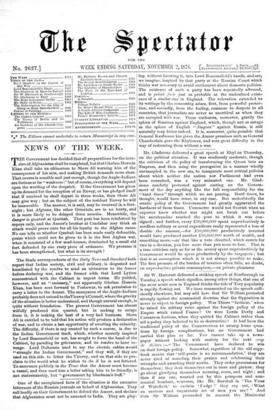The Simla correspondents of the Daily News and Standard both
report that Indian society, civil and military, is disgusted and humiliated by the resolve to send an ultimatum to the Ameer before declaring war, and the former adds that Lord Lytton remonstrated with the Cabinet in urgent terms. He yielded, however, and an "emissary," not apparently Gholam Hussein Khan, has been sent forward to Peshawur, to ask permission to carry a letter to the Ameer. The annoyance of the Anglo-Indians probably does not extend to theViceroy's Council, where the gravity of the situation is better understood, and though natural enough, is quite without foundation. The present Government has almost wilfully produced this quarrel, but in seeking to escape from it, it is making the best of a very bad business. Shere Ali is entitled to be told that his action will produce a declaration of war, and to obtain a last opportunity of averting the calamity. The difficulty, if there is any created by such a course, is due to the Indian Government itself, which, whether secretly inspired by Lord Beaconsfield or not, has sought to force the hand of the Cabinet, by parading its grievances, and its resolve to have re- venge. Lord Dalhousie used to say the electric cables would "strangle the Indian Government," and they will, if they are used on this side to fetter the Viceroy, and on that side to pro- claim to the world what he wishes to do if he is not fettered. To announce publicly in the Times that the Ameer must become a vassal, and then send him a letter asking him to be friendly, is not statesmanship, but "government by blindman's buff."


































